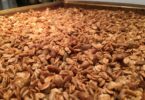Editor’s note: This story is part of a series on the trends that will shape the food and beverage industry in 2022.
Nature’s Fynd, which creates what it describes as a nutritious and versatile food protein through fermentation from a fungus found in a volcanic spring at Yellowstone National Park, has an unconventional brand story for a food company.
Chief Marketing Officer Karuna Rawal said the company has been doing research for years to gauge what consumers think of its origins, products and messaging. Before the pandemic, more than half of consumers said they were interested in food from the company, Rawal said. But as the pandemic has continued, the percentage of interested consumers has increased by double digits.
“I think people have been exposed a lot more to what’s happening in our environment,” Rawal said. “I think people are thinking about the connection between their food and climate change a lot more than we have in the past. I think all of those forces are combining to make this a prime opportunity.”
Nature’s Fynd’s products — which currently include two varieties each of sausage patties and cream cheese — debuted in a few markets last year, but the company has reached the scale and capacity needed for a national launch this year. Several other companies that use fermentation to make meat analogs are also preparing for widespread 2022 product launches, including Meati Foods, Aqua Cultured Foods and Atlast Food.
And Quorn, whose products predate the founding of plant-based meat giants Beyond Meat and Impossible Foods, has plans for a new push this year that USA President Judd Zusel hopes will make it the leader in chicken alternatives. Its process of using fermentation to create a unique protein can make analogs with a more meat-like profile.
Quorn’s ChiQin Cutlets
Courtesy of Quorn
« You get the flavor, the texture, the same taste profile as real chicken, and that for us is a huge differentiator, and that’s why we feel like it really does create the best-tasting chicken alternative products, » he said.
Even Big Food is looking at fermented analogs for future meat-free products. Last year, Hormel’s venture arm, 199 Ventures, entered into an exclusive partnership with fermented meat analog maker The Better Meat Co. to develop meat alternative products and bring them to market.
Fermentation is old technology that humans have relied upon for millennia for food and beverages including beer, kimchi and yogurt. But the latest spin on it will bring new types of alternative products to consumers. Products made through fermentation also have an extremely low carbon footprint, can be produced quickly, and are relatively inexpensive.
“Now we’re seeing an influx of alternative protein products that allow that sector to provide more choice to consumers,” said Emma Ignaszewski, corporate engagement project manager at The Good Food Institute. “And I think that’s quite a beautiful thing, that consumers are starting to have more and more choices in the alternative protein space.”
Why create analogs through fermentation?
While plant-based food is almost synonymous with meat, dairy and egg alternatives, it isn’t the only player in that game. GFI has called fermentation the « next pillar » of alternative protein. Through the process, companies can make protein material for meat and dairy analogs — known as biomass fermentation — as well as proteins identical to those created by animals that are used to create ingredients such as dairy and egg — known as precision fermentation.
GFI tracks startups in the fermentation space, and issued a report on the state of the industry in 2020. Ignaszewski said biomass fermentation companies represented eight of the 14 companies founded in 2019. In 2020, precision fermentation companies made up nine of 13 new players in the space. And now, the products from those startups are preparing to hit the market — and targeting a much wider audience than vegetarians and vegans.
“The proliferation of fermentation as a technology is paralleling the alternative protein industry’s new strategy of appealing to omnivore consumers,” Ignaszewski said.
Meati, which was founded in 2016, uses fermented mushroom mycelium — the fungi’s root structure under the ground — to make meat analogs. The company says its products can mimic the appearance, texture and taste of actual meat, but without the environmental, health and financial costs of a meal that came from an animal.
Co-founder and CEO Tyler Huggins said that Meati wants to create products that meat eaters will enjoy, with the same taste and experience as meat. But he said the company’s mission, realized through its products, goes farther than that.
“It had to be whole food nutrition, meaning minimally processed,” Huggins said. “This isn’t a man-made product using a bunch of ingredients that are off the shelf that make food together. This is really nature harnessed, and that’s really a key differentiator from us.”

A steak analog from Meati
Courtesy of Meati
Last year was a key period of ramping up for the Colorado-based startup. In July, Meati raised $50 million to expand and prepare to launch its whole-cut beef and chicken later this year.
Huggins, who grew up around his family’s bison farm in Nebraska, calls Meati’s fermentation facilities « ranches. » The company has operated its « pilot ranch, » which can produce the equivalent of a cow overnight, for some time. Some of the funds raised last summer are to build out Meati’s nearly 80,000-square-foot “mega ranch.” This facility, which Huggins said will start production in the second half of 2022, will have a final output capacity of 15 million pounds of product a year when it is completed.
“That’s where the scale gets to the point where we can get national distribution and really set the stage to be the market leader,” Huggins said.
Meati’s products are primed to hit grocery shelves and foodservice menus later this year, Huggins said. He couldn’t go into detail, but said Meati is working with groups and people known in the industry — including thought leaders in the food and nutrition space and “like-minded brands.” Some partnerships — starting with foodservice — will be announced in the coming months, Huggins said.
« We’re seeing an influx of alternative protein products that allow that sector to provide more choice to consumers. And I think that’s quite a beautiful thing, that consumers are starting to have more and more choices in the alternative protein space.”

Emma Ignaszewski
Corporate engagement project manager, The Good Food Institute
Nature’s Fynd, which was founded as Sustainable Bioproducts a decade ago, also spent last year getting ready to have a huge 2022. In July, it raised $350 million — the second largest single funding haul of any food tech company last year — to help lay the groundwork for this year. Its sausage and cream cheese analog products went up for sale, first as an extremely limited offering online, and then later in the year at regional grocery store chains Berkeley Bowl, Mariano’s and Fairway Market.
Rawal with Nature’s Fynd said the company has plans to accelerate that expansion, growing its presence at these chains and expanding into other geographic locations. Nature’s Fynd hopes to have « a pretty significant presence » by the end of 2022, she said.
Nature’s Fynd uses biomass fermentation of the fungus Fusarium strain flavolapis to create a protein it calls Fy, which is used as an ingredient. CEO and Co-Founder Thomas Jonas has said it has diverse application potential in food and beverage.
While Nature’s Fynd’s products are new on the market, Rawal said they are off to a good start. In the company’s first month at Berkeley Bowl, an independent grocery store in California, it had the top-selling SKU in both dairy-free cream cheese and meat alternatives, Rawal said. She attributed part of that to on-the-ground marketing. Rawal estimated Nature’s Fynd has handed out well over 10,000 samples.
Rawal said many consumers have told her they were pleasantly surprised by how much Nature’s Fynd’s sausages and cream cheese taste like their animal-derived counterparts.
“Quite a few say to us, ‘I actually like this even better,’ » Rawal said. « And once they hear the health and sustainability and other benefits, they’re pretty sold. »
Quorn, whose fermented analogs made from mycoprotein have been on the U.S. market since 2002, is doubling down here given the stratospheric rise of plant-based meat products — especially chicken alternatives.
Quorn’s parent company, noodle giant Monde Nissin, has invested heavily into raising the profile and improving the offerings for the fermented analog brand in the United States. After Monde Nissin went public on the Philippine Stock Exchange last year, the company committed nearly 16 billion pesos ($335 million) to expand its presence here.
Those funds have gone into both product and marketing. Last summer, Quorn opened up a culinary center in Dallas dedicated to R&D and product development catering to the U.S. palate. Late last year, Quorn launched its new Meatless ChiQin offerings, both as sandwich-sized patties and boneless wings. Actress and talk show host Drew Barrymore entered a multi-year partnership to be Quorn’s « chief mom officer » — a spokesperson and adviser with whom the company’s target demographic of middle-aged moms can identify. And a new marketing campaign, complete with a packaging redesign, is planned for this year.
Zusel said that the new attention to the U.S. market is all about making a product that is specifically targeted to the preferences of consumers here and building brand recognition.
« We know if we can get people to try Quorn, they will love the food and they will come back, and they will buy it again, » Zusel said.
Unique benefits
While plant-based meats have a bright health halo, research has shown they aren’t necessarily much better for consumers than products that come from animals.
Fermented analogs, on the other hand, may have much deeper health benefits than animal- or plant-based options. Quorn, which has actively funded and participated in health and nutrition research on mycoprotein for more than three decades, has found it is good for muscle growth and contributes to lowering cholesterol. Mycoprotein is high in dietary fiber, low in fat and a source of nutrients including riboflavin, folate, phosphorus, zinc, choline and manganese, Quorn’s research has found.
Nature’s Fynd has determined through its own nutritional research that Fy is a complete protein source, with all 20 amino acids — including the nine most essential ones. It’s low in fat, high in fiber and easily digestible, the company says.

Nature’s Fynd breakfast sausage
Permission granted by Nature’s Fynd
And Meati’s mycelium forms the bulk of its products, meaning they have relatively short ingredients’ lists, which is in sharp contrast to those for many plant-based meat analogs.
“We want to make sure that people understand that we’re not just a regular plant-based product with a new label,” Huggins said. “That we’re something completely different. Entirely new. A whole new type of whole food.”
Through fermentation, Huggins said that Meati can make meat analogs that surprise consumers. He said consumers often ask the company how it was able to make something that is so meat-like. They have also told the company that the plant-based alternatives they have tried didn’t satisfy them in the same experiential way that products from Meati do, Huggins said.
Rawal with Nature’s Fynd said that not being plant-based has actually helped the company in some conversations with retailers. Since there are so many plant-based products crowding into the market, there is an appetite for different kinds of alternatives.
The production method for fermented meat analogs also can provide it with an advantage over plant- and animal-based options. Nature’s Fynd’s 35,000-square-foot facility, which opened in February 2020, is 10 minutes from downtown Chicago, Rawal said. Construction is underway on a second 200,000-square-foot facility nearby, which the company has said will be able to produce three to five times as much protein.
“We want to make sure that people understand that we’re not just a regular plant-based product with a new label. That we’re something completely different. Entirely new. A whole new type of whole food.”

Tyler Huggins
CEO and co-founder, Meati
“We are able to create protein in a city, near where people live, and that gives us some advantages in terms of not having to transport food all over the place, which adds to greenhouse gas emissions,” Rawal said. “So we’re able to create food literally anywhere because you don’t really need large tracts of land and water and all of the other resources.”
The smaller physical production footprint of fermented meat analogs also contributes to a smaller environmental footprint. Quorn plays up its sustainability, and was one of the first to include third-party accredited carbon footprint data on its packaging in its home country of the U.K. Zusel said Quorn works to communicate to consumers how much better its products are for the environment.
“For one meal, they [consumers] save the water of 20 showers, they lower their carbon footprint,” Zusel said.
Not exactly plant-based
Currently, fermented analogs tend to be lumped in with plant-based products. They are usually shelved together, and most data firms capturing product sales information include fermented products in the plant-based category. And with only one major player in the fermented space — Quorn — there haven’t been any big efforts to differentiate the segment, though communicating food tech to consumers is an issue companies are working through.
Zusel said that the company’s biggest challenge right now is building brand awareness. It wants consumers to know that Quorn is not only a meat-free alternative, but also made in a way that results in a product very much like chicken. He explained that there’s a hierarchy of messages to pass along.
“Over time we will talk more about fungi,” he said. “We will talk more about what our product is made from as a differentiator, because as they dig deeper and understand it a little bit more, they’ll want to know why it’s so much like chicken.”

Salad with Meati’s chicken.
Courtesy of Meati
Rawal said Nature’s Fynd has had many discussions about whether to “ride the plant-based wave” or try to be its own type of product. It chose the latter. The first thing that a visitor to the company’s website sees is an introductory video that opens with film showing the highly acidic spring where Fusarium strain flavolapis was found, as a narrator says, “It all started with a volcano.”
“We explain that this is not plant, not animal, but a third kingdom called fungi, and most people know a little bit about fungi,” Rawal said. “So I think once we start educating, it becomes very clear that people are much more open and willing, frankly, than we would have assumed, even five years ago.”
While plant-based food generally has an admirable health halo and it’s a category that consumers seeking alternatives look at, Huggins said he wants to be able to differentiate Meati’s products. After all, he said, plant-based meat has a reputation for long ingredient lists, questionable nutrition and high prices: three things Meati wants to avoid.
Expanding the alternatives
While Quorn has been fairly unique among meat alternatives in U.S. grocery stores for years, Zusel said he thinks it’s « fantastic » that more meat analogs made by fermentation will be joining the brand this year. It’s validation for the process and products Quorn has been honing since the 1980s, especially since other food giants have funded and partnered with the newer companies.
“I think it’s only positive, and I think the category can only grow if there are more players and we’re all successful,” he said.
Huggins is quick to share Meati’s ambition: The company hopes to lead meat alternatives in short order. Last month, the company announced it hired General Mills veteran Scott Tassani as its president. Tassani, who is known for his deep personal relationships with retailers nationwide, can help Meati feed the world this year, Huggins said.
“We’re an early-stage hypergrowth startup, there’s no doubt about it, but we have big intentions to be the category leader and to be nationally and globally accessible,” Huggins said. “So we need to function and establish ourselves, building the discipline and rigor in order to be a world-class food company. And we’re taking every measure to do so, and Scott’s gonna play a big role in that.”
“Quite a few say to us, ‘I actually like this even better.’ And once they hear the health and sustainability and other benefits, they’re pretty sold. »

Karuna Rawal
Chief marketing officer, Nature’s Fynd
Aside from the products already on the market or almost there, Ignaszewski with GFI predicts food made through fermentation will be used for many applications in years to come. Fermented items could be mixed with existing plant-based products as well as cell-based meat and fats, creating ingredients and altogether new hybrid alternative protein products.
Rawal with Nature’s Fynd expects to see fermented products expand this year because she says the benefits — from a taste, nutritional and sustainability standpoint — are becoming apparent to everyone. As more products come to the market, she said consumer demand for them is likely to grow. And that will potentially drive other players to get into fermentation.
Huggins agrees. He doesn’t see fermented meat analogs as a total replacement for meat, but growing mycelium through fermentation is a relatively easy and straightforward way to make a better meat analog suitable for everyday consumption.
“In the end, you’re going to have a superior product, and my belief is that a superior product, as long as it’s accessible, will always win,” Huggins said. « I come from the world of ranching. I do like regenerative, ethically grown, animal-based meat. I hold my protein standards very high, and Meati checks all the boxes for me. I think in the end, the consumer would agree with me. »








